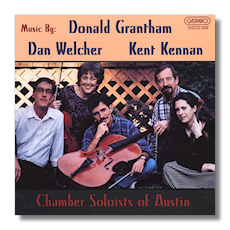
The Internet's Premier Classical Music Source
Related Links
- Latest Reviews
- More Reviews
-
By Composer
-
Collections
DVD & Blu-ray
Books
Concert Reviews
Articles/Interviews
Software
Audio
Search Amazon
Recommended Links
Site News
 CD Review
CD Review
Chamber Soloists of Austin

- Donald Grantham: From the Diaries of Adam and Eve
- Dan Welcher: Zephyrus
- Kent Kennan:
- Threnody
- Dream Tigers
- Dance to an Ostinato
The Chamber Soloists of Austin
Gasparo GSCD-339 61:21

- Donald Grantham: From the Diaries of Adam and Eve
- Dan Welcher: Zephyrus
- Kent Kennan:
- Threnody
- Dream Tigers
- Dance to an Ostinato
Gasparo GSCD-339 61:21
Summary for the Busy Executive: Austin city limits.
This CD comes down to a Texas love-fest. Not only are the performers based in Austin, the composers all teach or have taught in town at the University of Texas. Hook 'em, horns!
A newcomer to Austin, I haven't had much of an opportunity to suss out the composition atmosphere here. What I've heard, pretty conservative, may not fairly represent the place. Composers at the state university in Denton strike me as more adventurous. All in all, however, I'd rather live here.
The program begins with Donald Grantham's From the Diaries of Adam and Eve, based on a bit of late Mark Twain. As far as song text goes, it's a fairly gutsy choice, although Twain's Diaries contains some of his most lyrical writing. Grantham mixes it up, however, even including slapstick, and fairly successfully at that. At slightly more than half an hour, the piece runs a bit long, with dead stretches in the final movement especially that sound like a composer on automatic. The idiom takes off from Forties Copland, another large risk. The listener might compare Grantham to Copland and who comes off worse, and the idiom itself is so no-frills, so open, that it depends on a consistently high level of invention. Grantham to a large extent avoids invidious comparisons to well-known masterpieces but doesn't escape the cruelty of the idiom's demands. Still, Grantham pulls off, for me, one of the great lines of love-poetry in English, Adam's eulogy by Eve's grave: "Wheresoever she was, there was Eden." Twain by the time he'd written that had lost his own beloved wife, and there's more genuine sorrow in those six words than in all of Milton's Lycidas.
Dan Welcher has an enviable reputation, with steady commissions. I find his music well-crafted but more than a little bland – in short, just the sort of composer who should teach in the academy. Zephyrus, for flute and string trio, impresses far more with its craft and structural detail than with its emotional payoff. Because of the flute's tendency, in its lower registers, to get lost in the texture, composers usually write light divertimenti which show off its brilliant, piercing upper voice. Welcher deliberately sets out to work against type, with a piece as serious as a man with a loaded Bible. Musically, Zephyrus concerns itself with dramas of transformation and transference. For example, themes from the first movement appear in others, and in the first movement, a high-energy flute gradually runs out of gas, while a lethargic string accompaniment gradually picks up. The second movement, a lament, quotes the "Believe" theme from Leonard Bernstein's Third Symphony "Kaddish" (not the second, as stated in the liner notes). Bernstein died while Welcher was writing the piece. Nevertheless, it's not simply a quote dropped in, but something that emerges from and submerges in a far more troubled dialogue with Welcher's own material. The last movement, a rondo, signals its section changes with metrical modulations (eg, a triplet within duple time becomes triple time). The main theme sounds like klezmer, and the end is a virtuosic riot of changing pulses. All in all, this is the most substantial piece by Welcher I've heard.
The program closes out with three fugitive pieces by Kent Kennan for flute and piano. Kennan either wrote very little or published very little. Despite the relative popularity of his trumpet sonata and Night Soliloquy, you don't often run into his music, more's the pity, for it shows a genuine, individual voice. Kennan may be known more for his textbooks on composition (I once read his Counterpoint) than for his actual music. We have here three very poetic morceaux. My favorite of the three is Dream Tigers, with a title inspired by Borges. It features such avant-garde techniques as overblowing and underblowing on the flute and the pianist mucking about with the insides of the piano. It's mainly an exercise in tone-painting, and it portrays a jungle atmosphere. Normally, this subgenre annoys me no end, since the pictorial tends to overwhelm all sense of musical movement. Not here. The odd techniques don't call attention to themselves and hang together with musical logic. The end – asymmetrical, out of the blue – will haunt you.
Flutist Karl Kraber, many years with the Dorian Wind Quintet, stands out in both the Welcher and the Kennan. Joan Kalisch, violist, and cellist Anthony Stogner lend substance and sensitivity to Zephyrus. Gregory Allen masters a wide tonal palette and partners Kraber beautifully in the Kennan. Of the two singers in the Twain, I prefer soprano Suzanne Ramo's Eve to baritone David Small's Adam. She not only sings well, she brings interest to the character, especially in "My first sorrow." The recorded sound is no more than okay, but it's not actively off-putting either. Besides, Telarc won't be recording any of these works anytime soon.
Copyright © 2007, Steve Schwartz




















